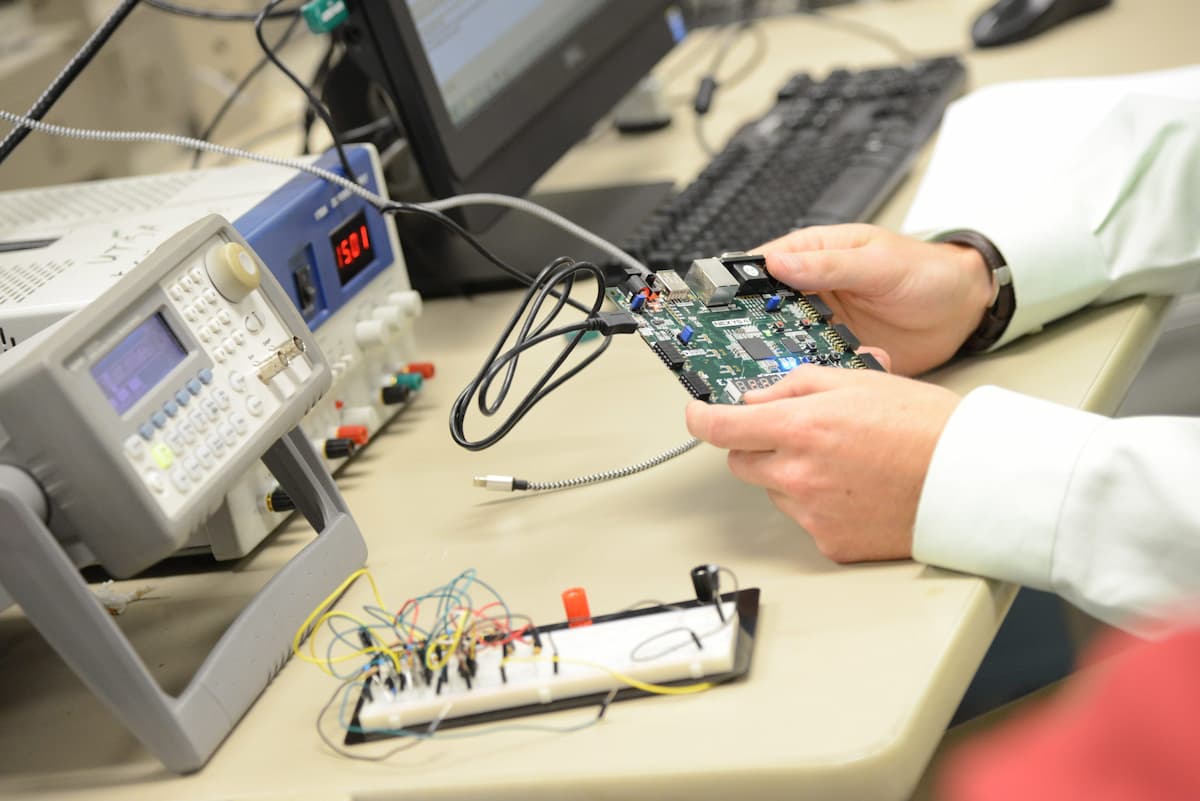A) Program Educational Objectives
The Bachelor of Science in Mechanical Engineering program (BS-ME) prepares students to attain the following program educational objectives a few years after graduation:
- Have engineering or other careers in industry, government, and/or pursue advanced graduate or professional degrees.
- Apply their engineering knowledge, critical thinking, creativity, and problem-solving skills in professional engineering practice or in non- engineering fields.
- Continue to advance their knowledge, communication, and leadership skills through graduate education, professional development courses, self-directed study, and/or on-the-job training, and experience.
- Apply their understanding of societal, environmental, and ethical issues to their professional activities.
B) Student Outcomes
Student outcomes describe what students are expected to know and be able to do by the time of graduation. These relate to the knowledge, skills, and behaviors that students acquire as they progress through the program. The BS-ME program has adopted student outcomes (1) through (7) required by Criterion 3 of the ABET–Engineering Accreditation Commission.
The student outcomes for the BS-ME program at UT San Antonio are:
1. an ability to identify, formulate, and solve complex engineering problems by applying principles of engineering, science, and mathematics.
2. an ability to apply engineering design to produce solutions that meet specified needs with consideration of public health, safety, and welfare, as well as global, cultural, social, environmental, and economic factors.
3. an ability to communicate effectively with a range of audiences.
4. an ability to recognize ethical and professional responsibilities in engineering situations and make informed judgments, which must consider the impact of engineering solutions in global, economic, environmental, and societal contexts.
5. an ability to function effectively on a team whose members together provide leadership, create a collaborative environment, establish goals, plan tasks, and meet objectives.
6. an ability to develop and conduct appropriate experimentation, analyze and interpret data, and use engineering judgment to draw conclusions.
7. an ability to acquire and apply new knowledge as needed, using appropriate learning strategies.
MAIE Enrollment and Degrees Awarded
| Academic Year | Enrollment Year | Total UG | Total GR | Degrees Awarded | ||||||||
|---|---|---|---|---|---|---|---|---|---|---|---|---|
| 1st | 2nd | 3rd | 4th | 5th | Associates | Bachelors | Masters | Doctorate | ||||
| 2022-2023 | FT | 122 | 103 | 151 | 207 | NA | 583 | 59 | ||||
| PT | 14 | 37 | 70 | 185 | NA | 306 | 63 | |||||
| 2021-2022 | FT | 98 | 133 | 161 | 255 | NA | 647 | 57 | NA | 163 | 25 | 5 |
| PT | 24 | 35 | 64 | 189 | NA | 312 | 65 | |||||
| 2020-2021 | FT | 145 | 146 | 187 | 266 | NA | 744 | 50 | NA | 170 | 16 | 10 |
| PT | 22 | 26 | 72 | 208 | NA | 328 | 65 | |||||
| 2019-2020 | FT | 150 | 166 | 172 | 268 | NA | 757 | 52 | NA | 188 | 19 | 9 |
| PT | 5 | 31 | 56 | 198 | NA | 290 | 56 | |||||
| 2018-2019 | FT | 234 | 147 | 175 | 330 | NA | 886 | 66 | NA | 200 | 28 | 3 |
| PT | 12 | 41 | 55 | 185 | NA | 293 | 45 | |||||

Your future starts here
Offering degrees and certificates in engineering, architecture, construction science and management, historic preservation, interior design, and urban and regional planning at undergraduate, graduate, and doctoral levels
5
Degree programs
500+
Students
27
Faculty

